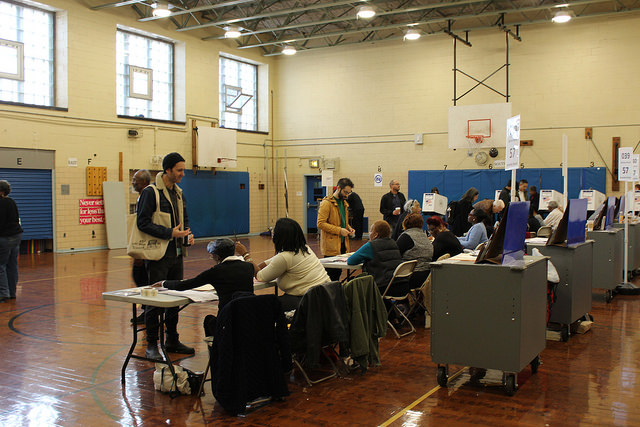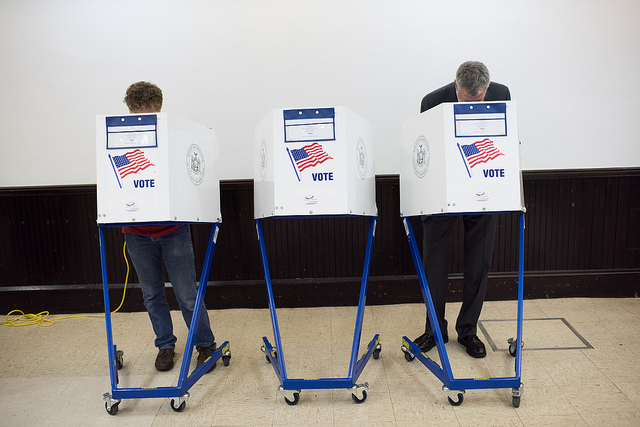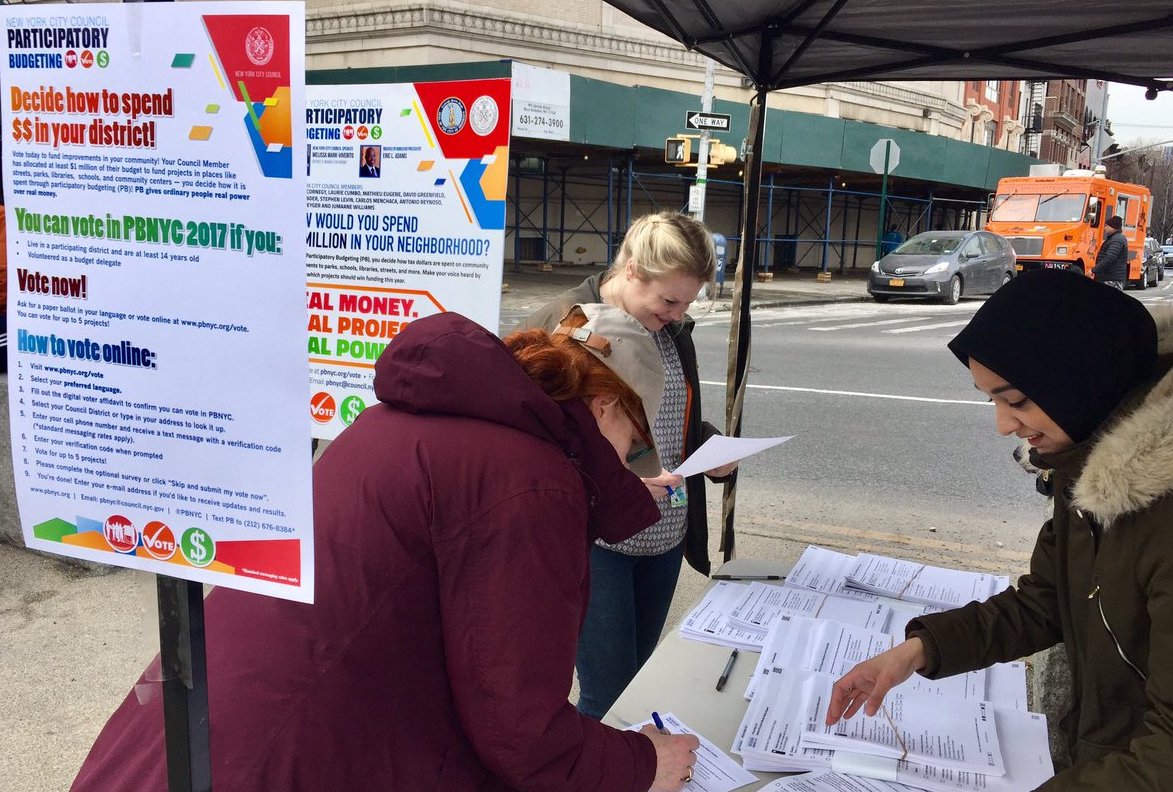Fix New York’s Broken Balloting and Election Laws

(photo: Gotham Gazette)
On Tuesday millions of New Yorkers attempted to exercise their constitutional right to vote. However, far too many in New York City were met with broken ballot scanners and hours-long lines that stretched for blocks in the pouring rain. It is encouraging to see so many citizens making the time and effort to vote, but incredibly disheartening to see our broken election system failing them.
With the impending arrival of the long-awaited trifecta of Democratic leadership in New York State (Democratic Governor, Senate and Assembly) alongside reform-minded allies in New York City government, fixing our archaic and ineffective electoral process should be the first order of business once the new Legislature is seated in January.
At polling sites across New York City there were reports of at least one – and sometimes all – ballot scanners malfunctioning. Thousands of voters braved hours of waiting and confusion just to fill out unscanned emergency ballots. Even in places where some of the scanners did work (such as the paltry two at my polling place in Boerum Hill, Brooklyn), poll sites and workers seemed overwhelmed by the dramatic turnout -- which still wasn’t even at 40% in the city or anywhere near presidential election levels.
We will never know how many voters gave up on the long lines and didn’t vote, or what the chilling effect may be on future turnout. The initial response from the Board of Elections on the scanner malfunctions is that soggy or imperfectly torn ballots jammed the machines. Aren’t these issues we could -- and should -- have prepared for? Regardless of the merit of these questionable excuses, the bigger issue is clear: our current election systems are incapable of meeting the needs of our electorate.
It’s not just machines and preparation.
New York trails other states across the board in voting laws and procedures. One of the main reasons for the problems this past Tuesday is that poll sites were simply overwhelmed by the sheer numbers of voters attempting to vote on a single day – there weren’t enough poll workers or scanners. This is why 37 other states have enacted some form of early voting, which expands the eligible voting period. This both lessens the logjam on a single day and has the added benefit of giving voters more flexibility. It also can help flag issues like machine jams due to two-page ballots.
Early voting in other states over the past few weeks saw a surge in young and first-time voters, the same voters who may have given up on voting Tuesday or have already become jaded by the experience.
Relatedly, New York is the only state in the entire nation which holds its state and federal primaries on separate days, which is incredibly confusing for the average voter and fiscally wasteful. With the additional $25 million or so spent on having a second primary day, New York could make great strides towards enacting early voting. New York also holds “closed” (party-based) primaries with the earliest party registration deadlines in the nation, which caused an uproar in the last presidential election. Where other states have enacted additional pro-voter participation features such as same-day registration and pre-registration for 16- and 17-year-olds, New York continues to fall further and further behind. These policy shortcomings are compounded by additional confusion such as the Brooklyn “voter purge” in 2016 and the more recent 400,000 person “inactive voter” misfire just last month. Our elected leaders at the city and state levels must take a close look at both our laws and the Board of Elections.
With all of these issues, it is truly amazing how many voters turned up on Tuesday in a state with such a dismal record. New York State has the fourth most registered voters of any state in the nation, but had the eighth worst turnout in the 2016 presidential election. Imagine how many people might vote if they had an extra day (or several) to do so, if the lines were shorter, and if they could count on ballot scanners working.
It is time for New York City and State to finally make strides on voting access and ease and catch up with the rest of the nation. Our democracy depends on it.
***
Jamie Ansorge is an Attorney at Cozen O’Conner, Executive Board Member of the New Leaders Council NYC Chapter, and Co-Chair of the Democratic National Committee (DNC) Young Professional Leadership Council. On Twitter @AnsorgeNYC.
***
Have an op-ed idea or submission for Gotham Gazette? Email This email address is being protected from spambots. You need JavaScript enabled to view it.
Vote Yes Three Times to Improve New York City Democracy

(photo: Mayor's Office)
A political awakening is sweeping New York City. Voter turnout during the last election spiked nearly 300 percent. More New Yorkers are speaking out and looking to engage in the civic life and democracy of their city.
Earlier this year, hundreds of New Yorkers, many of them everyday people who gave up their personal time to attend a public hearing, voiced their concerns to a New York City Charter Revision Commission appointed by Mayor Bill de Blasio traveling the five boroughs. The Charter Commission boiled down hundreds of hours of public testimony into three proposals that will be on the back of Election Day ballots, each in the form of a yes/no question.
Voting "yes" on all three proposals will give New Yorkers new opportunities to channel their rising political energy and hopes for a more diverse and representative government.
A "yes" vote on Question 1 will empower everyday New Yorkers by amplifying their voices in political campaigns for local office. New Yorkers making contributions to candidates will have their small donations matched with $8 in public funds for every $1 donated. A $10 contribution will grow to $90; a $100 donation multiplied to $900. And, the influence of big money will be further slashed by reducing the maximum individual contribution by a third. This proposal will also enable more New Yorkers to run for office themselves by raising small donations from their friends and neighbors. A "yes" vote on Question 1 is backed by Reinvent Albany and the New York Public Interest Research Group (NYPIRG), among others.
On Question 2, a "yes" vote will enable all New Yorkers to vote directly on a slice of the city’s budget to beautify a local park, make a pedestrian crossing safer, or any number of other ideas that come from local communities. A Commission would be created to organize and connect New Yorkers to volunteer opportunities in government and the private sector, among other responsibilities to foster civic engagement and make the city better. This proposal is strongly supported by leaders in the worldwide Participatory Budgeting movement, which this proposal will expand.
A "yes" vote on Question 3 will open up opportunities for more New Yorkers to serve on community boards. Community boards provide advice on local land use, neighborhood quality of life issues, and the city budget, and serve as the level of government closest to the people. Yet, according to community board and census data, many boards consist of members who have served for decades, and do not reflect the diverse makeup and viewpoints of their neighborhoods.
By requiring community board members step down from their positions for two years after serving eight years, everybody in the community will have an opportunity to participate and have their voices heard. This proposal is strongly supported by citywide, grassroots groups like Transportation Alternatives that have decades of experience working with community boards.
A yes, yes, yes vote on the three ballot proposals will collectively harness the heightened activism of New Yorkers as robust participants in their democracy and their city. Find the questions on the back of your ballot and approve them for a stronger New York City.
***
Alex Camarda is Senior Policy Advisor for Reinvent Albany. On Twitter @alex_camarda & @ReinventAlbany.
***
Have an op-ed idea or submission for Gotham Gazette? Email This email address is being protected from spambots. You need JavaScript enabled to view it.
Flip Your Ballot, Vote Yes on 2 for Democracy

(photo: @pb_nyc)
On Election Day -- Tuesday, November 6 -- New Yorkers have a unique opportunity to vote for democracy. By voting “yes” on three ballot proposals, we can turn New York City into a beacon for democracy.
The ballot proposals will make it easier for ordinary New Yorkers to run for office, vote in elections, have a say in city decisions, and serve on community boards. They will make our government better and our voices stronger.
Proposal 2 is especially powerful. It will create a Civic Engagement Commission, dedicated to building a more participatory democracy, one that extends beyond any election day. By investing in civic engagement, we can create space for millions of residents to get more involved, step up as leaders, and help make decisions.
The Commission would create a citywide participatory budgeting (PB) program, giving New Yorkers a greater say in how our how tax dollars are spent. Through PB, residents brainstorm spending ideas, turn these ideas into proposals for a ballot, and then vote to decide which proposals get funded.
In New York City Council’s PB program, 100,000 people have decided how to spend around $40 million per year. Residents - including non-citizens and people as young as 11 years old - have developed and approved hundreds of improvements to public schools, parks, streets, libraries, hospitals, and housing. Voters have been more representative of the city than in local elections, with low-income people, women, and people of color participating at higher rates.
This engagement has broad and long-lasting impacts on our democracy. Years of PB proposals for school air conditioning and bathroom repairs sparked city-wide campaigns, which won $180 million to install air conditioning and fix bathrooms at schools across the city. PB has turned hundreds of residents into community leaders, boosting their civic skills and knowledge. It even increases electoral turnout, making people 7% more likely to vote in other elections.
The charter revision would build on this success, allowing more people to make bigger decisions. Other global leaders in democracy, such as Paris and Madrid, have successfully launched similar programs. In Paris, Mayor Anne Hidalgo has committed 500 million Euros for residents to allocate - for school, district, and citywide projects. In Madrid, the city launched citywide PB and an office of participation, and 400,000 people have gotten involved (in a city not much bigger than Brooklyn).
In New York, PB voters consistently tell us that they want to make bigger decisions. City Council members and their staff tell us that they need more resources and support to engage their communities. Proposal 2 will do both.
The Civic Engagement Commission will be an opportunity for us all to shape the city’s future. While city agencies typically only report to the Mayor, in this case the Mayor, City Council Speaker, and Borough Presidents will each appoint Commission members. The ballot proposal also requires the Commission to partner with community organizations. The Commission will not be perfect (what institution is?), but it will make our city better, by inviting neighbors to decide how their tax dollars are spent and providing more staff support and resources for civic engagement.
If we want to fix our democracy, we need to expand how people can participate. Vote yes on November 6 to show your support for our democracy.
***
Josh Lerner is Co-Executive Director of the Participatory Budgeting Project, a national nonprofit that empowers people to decide together how to spend public money. Carlos Menchaca is a New York City Council member representing District 38 in Brooklyn. On Twitter @joshalerner & @cmenchaca. (For more information, visit yesyesyesnyc.com and participatorybudgeting.org)
***
Have an op-ed idea or submission for Gotham Gazette? Email This email address is being protected from spambots. You need JavaScript enabled to view it.




